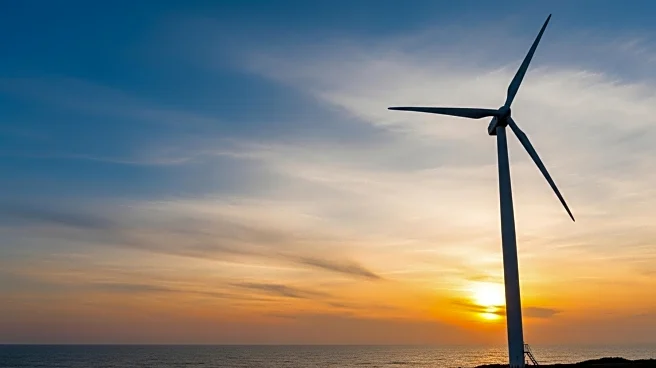What's Happening?
Norwegian oil giant Equinor has announced its support for Denmark's Orsted, the world's largest offshore wind developer, by pledging nearly $1 billion in fresh capital. This move comes as the Trump administration continues to criticize offshore wind projects, including ordering Orsted to halt work on a nearly completed wind farm. Equinor plans to participate in Orsted's $9.4 billion rights issue and maintain its 10% ownership stake. The company also intends to nominate a candidate to Orsted's board of directors. Despite the challenges faced by the offshore wind industry, Equinor remains confident in Orsted's business and the future competitiveness of offshore wind energy.
Why It's Important?
Equinor's backing of Orsted is significant as it highlights the ongoing tension between the Trump administration and the renewable energy sector, particularly offshore wind. The administration's recent cancellation of $679 million in federal funding for infrastructure projects supporting offshore wind underscores the political challenges faced by the industry. Equinor's support may bolster Orsted's position and could signal potential strategic shifts, such as a merger between the two companies' offshore wind portfolios. This development could impact the U.S. energy landscape, influencing investment decisions and policy directions in the renewable energy sector.
What's Next?
Equinor's strategic support and board representation in Orsted may lead to increased collaboration between the two companies, potentially exploring a merger of their offshore wind portfolios. The political climate remains uncertain, with the Trump administration's stance posing challenges for future offshore wind projects. Stakeholders in the renewable energy sector will likely monitor these developments closely, assessing the implications for investment and policy. Equinor's continued dialogue with Orsted and its monitoring of U.S. developments suggest ongoing engagement in navigating these challenges.
Beyond the Headlines
The Trump administration's criticism of offshore wind projects raises broader questions about the U.S. commitment to renewable energy and climate change mitigation. The cancellation of federal funding for infrastructure projects supporting offshore wind may have long-term implications for the industry's growth and innovation. Equinor's support for Orsted could be seen as a strategic move to counteract these challenges, potentially influencing other international energy companies' approaches to U.S. investments in renewable energy.











